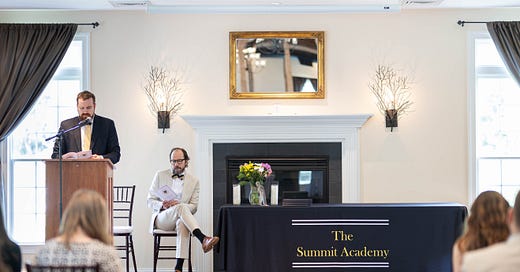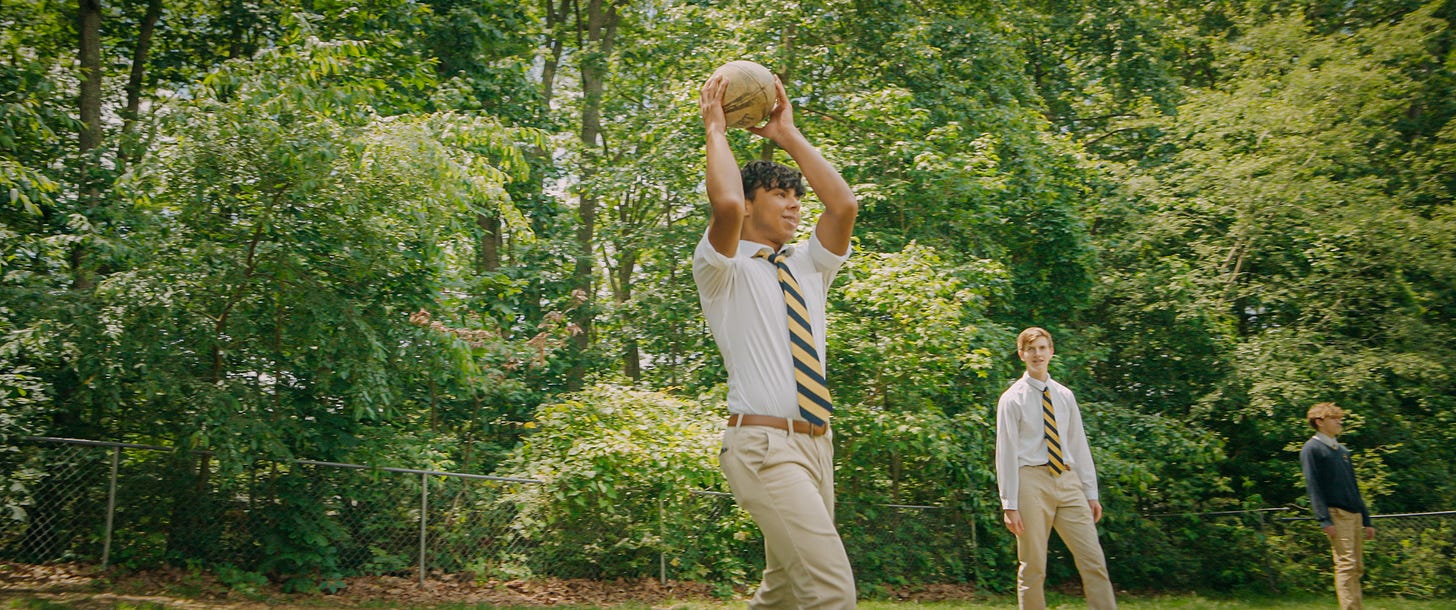Welcome back to A View from The Summit. The Summit Academy is a classical liberal-arts school rooted in the Catholic tradition, located in historic Fredericksburg, Va., serving students in grades 6-12. This newsletter informs readers about our school and the ways in which it is helping renew education and the Church.
Summer is finally upon us.
Students, get outside, and parents, encourage your kids to get outside!
By the way, although registration is now closed, The Summit is running its first summer program called Camp Frassati. Children in grades 3–8 will join two cohorts. Led by two Summit faculty, both former college athletes, the camp and its programming are outlined below:
OUTDOOR EXPLORATION: Between hiking scenic trails, exploring mysterious caves, paddling in the open water, and scaling rock walls, our campers will immerse themselves in the wonders of nature and make unforgettable memories with their peers.
SPIRITUAL GROWTH: In addition to outdoor activities, we'll also introduce campers to the inspiring life of Blessed Pier Giorgio Frassati. Through storytelling and reflection, they'll learn about his dedication to faith, service, and love for the mountains. We'll also guide them in prayerful reflection with scripture, providing moments of independent prayer and small group discussions.
SAFETY FIRST: At Camp Frassati, your child's safety is our top priority. Our camp directors are NOLS certified Wilderness First Responders, a professional level outdoor industry standard for outdoor guides/leaders. Additional guides, volunteers, and activity leaders are intentionally chosen to ensure they are qualified and equipped to provide a safe and enriching environment for your child.
Check back for camp updates later in the summer. As we settle into the new schedule until school returns in August, I’m pleased to share those moments that closed out a terrific year.
Featured Graduation Speeches:
Congratulations to the class of 2024. This great group will pursue construction and building development, nursing, and a host of other paths at their new schools, including Virginia Tech and Christendom College. We were blessed this year to enjoy two terrific speeches at commencement, which took place at Stevenson Ridge in Spotsylvania. These speeches reflect both the high-quality, innovative Catholic thinking happening here and the lively faith of our community.
Our invited speaker, Lance Casimir, is an attorney in Washington, D.C. who studied philosophy at The Catholic University of America and continues to serve his university on the Board of Trustees. In his speech, Lance urged Summit graduates to pursue real, authentic friendship, and offered them wise guidance about how best to do so in our busy, fractured world.
I have provided an excerpt below, although the full speech—well worth reading in its entirety—is available here. (Please do not republish without permission.)
At a time like this, it is common to hear about several commendable virtues such as courage, humility, or magnanimity. Some may encourage you to dream big so you can change the world. Others may suggest that you believe in yourself and learn from your mistakes.
This afternoon, I would like to focus on one area that I increasingly realize is desperately needed in our world today. And that one area is friendship.
Throughout your time at The Summit Academy, you undoubtably have made several friends. You have learned and studied with your friends. You have worked and served side by side with your friends. You have grown with your friends. You have shared in joys and sufferings with your friends. And certainly, I am confident you have prayed with your friends.
Friendship is something central in our life, and we can see the effects of a lack of friendship. Studies in recent years from colleges, universities, and research institutes have highlighted that we are “struggling to make friends and keep them.” One survey found “that Americans report having fewer close friendships than they once did, talking to their friends less often, and relying less on their friends for personal support.” In the last several months, this problem and trend has been called the “epidemic of loneliness.”
As you enter this next stage in your life, I want to encourage you to reflect on and, more importantly, to live four main points regarding friendship.
First, be a faithful friend.
You might recall these words from the book of Sirach: “A faithful friend is a sturdy shelter; / he who finds one finds a treasure. / A faithful friend is beyond price, no sum can balance his worth. / A faithful friend is a life-saving remedy, such as he who fears God finds; / for he who fears God behaves accordingly, / and his friend will be like himself. (Sirach 6:14–17).
Being a faithful friend requires time, understanding, and forgiveness. . . .
Second, surround yourself with faithful friends. Surround yourself with friends who are striving to serve God and to grow in holiness and virtue. . . .
Third, find reliable mentors for all aspects of your life. Each of us needs mentors who can help and guide us spiritually, personally, professionally, and so on. This really stems from a recognition that we do not know everything and we can always learn from others. . . .
Again, the full speech is available here, with permission from the author, for your reading. Many thanks to Lance for preparing this speech and traveling to be with us during our Friday graduation.
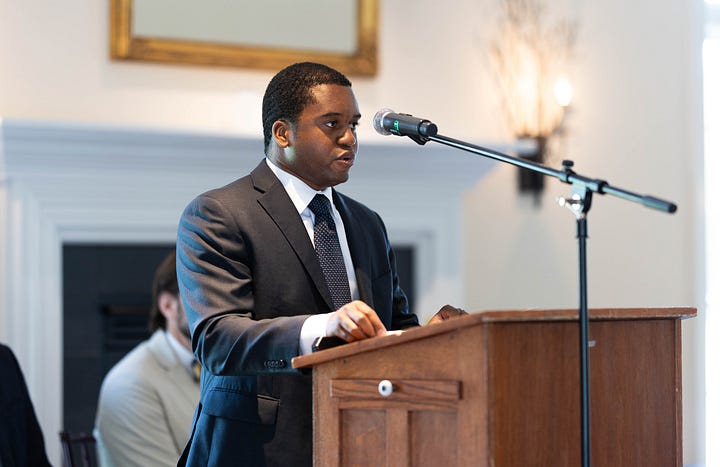

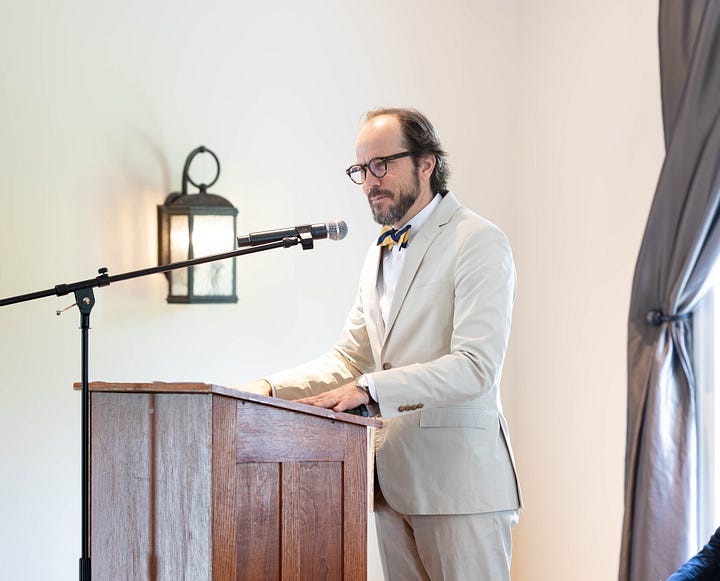
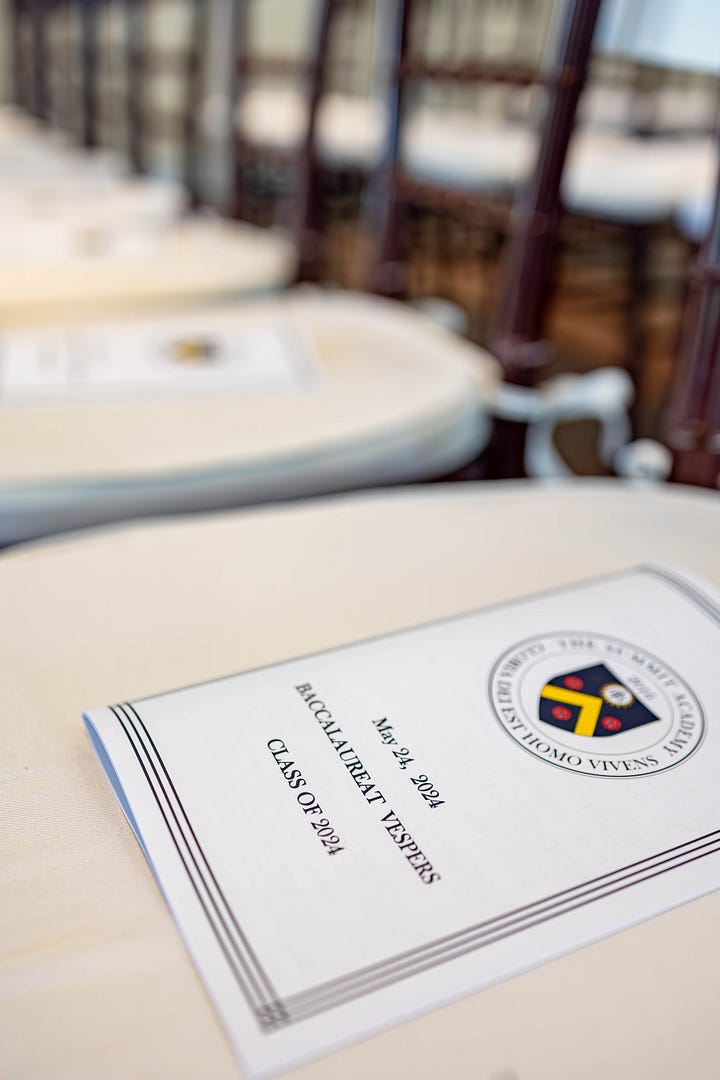
The second speech is from our headmaster, Julian Malcolm. The whole reflection on education and its purpose is compelling, and I’ll excerpt the most powerful part below:
In closing out your education in freedom, I hope to you leave with one thing, a motto that crystalizes the meaning of your liberal education:
God loves you. That is freedom.
God loves you. Not because you’re awesome or creative or independent or whatever.
God loves you because He is God... He loves you.
What would your life look like if you knew, really knew... that God loves you? Would you feel big? Or small? Or duty-bound? Or grateful? Content? Would you be at peace?
To live in that love would be freedom.
At The Summit we start every day with a prayer that reminds us of that love:
“In the tender compassion of our God / The dawn from on high shall break upon us/ To shine on those who dwell in darkness and the shadow of death/ And to guide our feet into the way of peace.”
We pray it every day, because we have a hard time believing it. And then when we see it, we forget it. So, we have to repeat it every day. It is a big truth.
Of course, the difficult thing about big truths is the bigness. The truth is so big that we can’t contain it. It contains us. God is in fact “the one in whom we live, and move, and have our being.“ That line is from the Book of Acts, but before St. Paul preached these words, the Greeks had already etched them into stone. St. Paul pointed out that it was the ancient Greeks, and not God’s chosen people, the Hebrews, it was the Gentiles, even they saw this. All mankind has a certain awareness of it.
Both the classical tradition and the Biblical tradition recognize that the world exists in a given order with its own reality and integrity, a reality and integrity that we do not invent, construct, or decide for ourselves, and that we violate to our own harm.
To be what you are then, requires a receptivity. Receptivity to reality, receptivity to others, and ultimately receptivity to the One in whom we have our being. God loves you...and In Him, we live and move, and have our being.
So how do we make sense of this “motto”? How do we treat it as real? Where do we see the dawn breaking upon us? Well, the canticle we pray is from the gospel of Luke. It is proclaiming the arrival of Jesus. This is the encounter in which God’s love is manifest to us in flesh and blood. Pretty real.
Our school seal quotes St. Ireneas: “The glory of God is man fully alive and the life of man is the vision of God.” That is not an arbitrary motto. It means that God has come among us and entered into our lives. He has taken up our nature to show us what it means to be man, and in doing so, He has revealed His nature as the God who is love.
It means that God loves you, and that love is realized in the living encounter with Jesus, who is our freedom.
The purpose of your education at The Summit was to point you to the reality of Christ and teach you to walk in the freedom of God’s love for you. I hope that you enjoy your freedom and share it with others.
Well said, Mr. Malcolm.
Summer Work:
It’s time for Summit administrators to turn to the work of summer—a few vacations, to be sure, but there’s plenty to be done.
Over the summer, we will be making materials for our upcoming capital projects; exploring partnerships, both local and national, related to that project; cultivating our parish relationships and improving outreach; assisting the Board of Directors in holding strategic planning and community listening sessions; on-boarding new faculty; continuing to architect the curriculum so that a student experienced sixth through twelfth grade as an unfolding narrative about the human experience; and much more.
We’ll also explore new ways to engage parents and the community as a whole. We’ll be hosting more events, including in September with renowned journalist Tim Carney. We’ll also be participating more in existing local programs. Up first is Theology on Tap, which in just its first year has become a successful monthly parish event. Our own Evan Williams, director of faculty and curriculum, will be presenting on the problem of evil during the July 1 session. Additional Summit faculty will be featured presenters during this coming academic year.
What I’m Reading Now:
I found many valuable insights in the podcast-turned-book How I Built This: The Unexpected Paths to Success from the World’s Most Inspiring Entrepreneurs by Guy Raz. Raz, the entrepreneurial founder of a popular podcast by the same name, details a sort of manual (if that can exist) for start-up founders that shares the collective wisdom and common threads from recent successes. At the least, it’s an interesting read for anyone interested in how new products and businesses are created to solve problems, and at the most, it’s an inspiring tale for would-be founders.
I also read—slowly—Fr. Jacques Philippe’s In the School of the Holy Spirit. A priest friend of mine often recalls how one of his seminarian professors began each class by asking, “Have you told the Holy Spirit you love him today?” He’s speaking to the fact that we can tend not to think much of the Holy Spirit. He is typically regarded as the most mysterious person of the Trinity, the hardest to get to know. And yet, He is perhaps the closest to us in our daily lives, prompting us towards good and moving us away from evil. This book provides concrete suggestions for how to listen for and seek the guidance of the Spirit.
Summer, though, is really the time for reading good literature. I’ll get more into that in the coming weeks. On my list are The Count of Monte Cristo, Anna Karenina, and perhaps some Tom Wolfe, who never fails to entertain.
If you are enjoying this newsletter, please consider subscribing via the button above and sending it along to others who might be interested. Revenue from paid subscriptions will support The Summit Academy of Central Virginia.

